
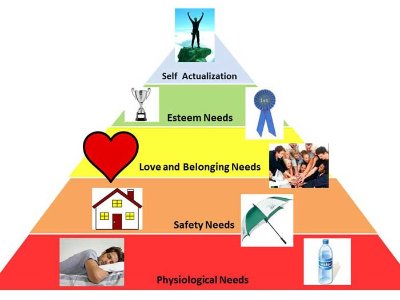 What’s a screaming sceptic? Well it’s not as bad as it sounds, and I reckon the world would be a lot better off with a good few more of them to be honest.
What’s a screaming sceptic? Well it’s not as bad as it sounds, and I reckon the world would be a lot better off with a good few more of them to be honest.
A sceptic is simply a reasonably normal human being who doesn’t automatically believe something if it doesn’t make sense. Or hasn’t been shown to be highly likely using unbiased methods. Even is something has been shown to be almost certainly true, a sceptic has no problem if new evidence comes along to the contrary. In fact, he’s delighted, because all he wants is the unbiased, objective truth.
The flip-side is that if something has been shown to be almost certainly false, a sceptic probably won’t believe it either. But again, if it turns out to be true after further investigation then that’s fine too.
The word sceptical is sometimes used in a derogatory way, and it’s true that some insensitive sceptics can be very irritating but the real reason a lot of people don’t like them is because they ask awkward questions about dubious beliefs which we’re loath to give up for a variety of reasons, even if they are nonsense.
Which brings me to the topic of this article: Logical Levels.
Robert Dilts’ Logical Levels, sometimes called Neuro-Logical Levels, model is one of many attempts to better understand some aspect of human behaviour. There are some clear similarities with psychologist Abraham Maslow’s well-known Hierarchy of Needs, which he first published back in 1943.
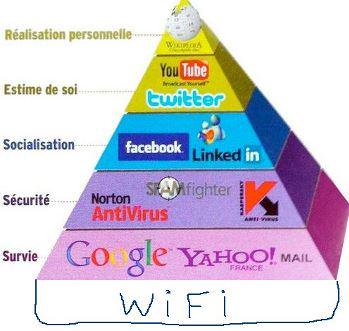 But whilst Maslow’s pyramid concerns things which motivate us to do things, the model Dilts developed is more often used to discover where underlying person problems are hiding out.
But whilst Maslow’s pyramid concerns things which motivate us to do things, the model Dilts developed is more often used to discover where underlying person problems are hiding out.
It’s great for using during an initial coaching or therapy session to fully understand the current situation and has even been adopted as one of the mainstays of the famous neuro-linguistic programming (NLP) methodology.
Which is what my reference above to healthy scepticism is all about (at last!). Although NLP still inspires almost religious fervour in some self-help and coaching circles, if you dig just a little you’ll discover that the serious research community gave up studying it years ago and regard it as a discredited pseudoscience.*
That’s NLP as a whole but as far as Dilts’ Logical Levels are concerned, I think it’s is genuinely useful consulting tool, which is why I decided to devote a mind map to it.
Read on to learn what all the different levels actually mean and see if you could use it in your life. I considered adding a ‘Level 0’ layer consisting of a reliable WIFI connection as the bedrock to all the other layers but that joke has already been made 🙂
*I’d like to mention that there are a lot of fantastic therapists, coaches and trainers who include one of more of the NLP principles in their practitioner’s toolbox, and that’s fine. We all need to be aware of a wide range of approaches and nothing exists in a vacuum.
In the end, the human interaction between the professional and his or her client is far more important than any given tool, and the skilled practitioner will know which approach to use at any given moment to help his client the most.





?This mind map was created using the iMindMap 10 software, which we love here at Mind Map Mad! Try a full working version free for a week and get 10% off if you buy through us by clicking one of the pretty buttons below!
JPG Image 800 px ~ JPG Image 1920 px ~ JPG Image 3500 px
PDF Doc 1.3MB ~ PDF Doc 3MB ~ Sab on Biggerplate!
JPG Image 800 px ~ JPG Image 1920 px ~ JPG Image 3500 px
PDF Doc 1.5MB ~ PDF Doc 3.1MB ~ Sab on Biggerplate!
Próximamente…
? (la paciencia es una virtud) ?
JPG Image 800 px ~ JPG Image 1920 px ~ JPG Image 3500px
PDF Document ~ Sab on Biggerplate!
Feel free to use my ‘Robert Dilts Logical Levels’ mind map as follows:
1) For any NON-commercial use
2) Leave it EXACTLY as it is
3) Don’t change ANYTHING
4) Make sure the © Copyright text is included and intact
5) See 2) and 3) (you get the idea!)
You CAN reproduce it online or embed it in your blog or website as long as you…
6) Respect 1-5 above
7) Include a credit to ‘Sab Will / Mind Map Mad’ AND include a clickable link to this page ( http://www.mindmapmad.com/robert-dilts-logical-levels-mind-map/ ) on the web page next to or near the image – thanks!
Anyway, it’s a place absolutely crammed with cool mind maps, including mine – he he! You can download the actual original iMindMap file (the mind mapping software I use) and play around with it yourself. Nice!





One very common way of using these ‘levels’ is to have the model running in the back of your mind as you conduct an initial session with someone who has come to you for help with some therapeutic or self-development issue.
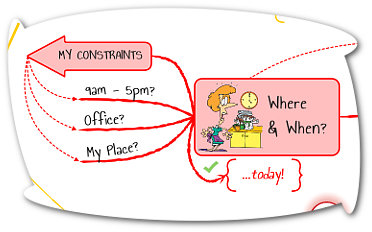 The first place to look for potential problems is in the day-to-day environment the person finds themselves in.
The first place to look for potential problems is in the day-to-day environment the person finds themselves in.
For example, if they are working in a noisy office and can’t concentrate, or a badly lit and stuffy workplace which sends them off to sleep, maybe that’s the problem.
It could be that the hours they have to work don’t fit in well with their home life or their own preferred ‘golden’ time when they are most productive.
Or it could be the people you are interacting with on a daily basis and the atmosphere at work, at school and yes, at home too. If it’s a ‘toxic’ environment, either literally or metaphorically, that would be something to look at changing as quickly as possible.
One of the key ideas of the logical levels is that if you have a problem at one level, the first place to look for potential solutions is one level up. So let’s look at Level 2 right now!





This is where we consider what we actually do on a day-to-day basis. More specifically, could it be that our regular actions and behaviour is leading to the environment we are not happy with?
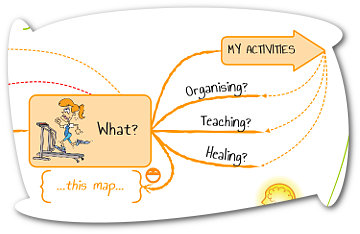 For example, do you arrive at work, scuttle off to your workstation, hide behind your computer screen and try to be as discrete and ‘invisible’ as possible?
For example, do you arrive at work, scuttle off to your workstation, hide behind your computer screen and try to be as discrete and ‘invisible’ as possible?
Or maybe you have real problems getting reports and important projects finished on time. Either of these behaviours could lead to an unpleasant working environment where suspicion or nervousness is rife.
Perhaps at home you submit to the will of your partner without question in order to simple ‘have a quite life’ although you would actually like to be more assertive and play a more active role in your family.
One interesting way of ‘turning things around’ is to wonder what your colleagues or even your family think of you. As a team member; as a manager; as a father; as a partner. If you realise that you are frequently criticised or disrespected it may be a warning sign that something in your behaviour is very wrong.
Which could mean that looking at the next level would be useful.





Here we think about whether you are playing your various roles in life to the best of your ability. If not, what needs to be improved or upgraded in order to be able to shine?
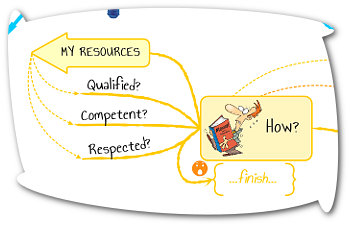 As well as trying to take on board (and daring to ask for) constructive criticism of you as a colleague or family member, you can also look around you. What skills do you admire in your colleagues or professional role models.
As well as trying to take on board (and daring to ask for) constructive criticism of you as a colleague or family member, you can also look around you. What skills do you admire in your colleagues or professional role models.
Can you train yourself in some of the desired characteristics you see in leaders in your industry?
Which of your family members seem to have the most positive or productive attitude in life and how does it compare your your own?
These attitudes and skills and aptitudes will be shown mainly in daily actions and behaviours – in other words Level 2 characteristics.
A mean-spirited moaner won’t tend to do generous things for others. A highly skilled person will usually be more than happy to pass on their knowledge to others who ask.
How comfortable you are, or aren’t, at any given level will come out positively, or negatively, at one or more of the levels below it. Now let’s look at the level where the real reasons for a vast number of underlying problems lie lurking: Level 4!





In effect, this level is a minefield! Why? Because it deals with all the preconceived ideas and beliefs and limitations you’ve been labelled with throughout your life, often against your wishes or even without being aware of it!
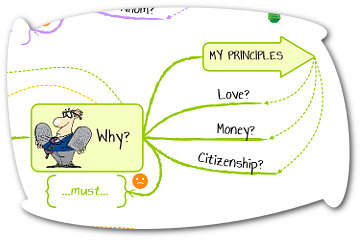 These can be as seemingly harmless as the way you were taught to peel an orange by your granny to less cool judgements such as being told by your art teacher that you’ll never be an artist. We absorb such ideas as innocent children keen to please (or not displease) and carry them with us to adulthood, where they can come back to bite us.
These can be as seemingly harmless as the way you were taught to peel an orange by your granny to less cool judgements such as being told by your art teacher that you’ll never be an artist. We absorb such ideas as innocent children keen to please (or not displease) and carry them with us to adulthood, where they can come back to bite us.
If we were taught to be ‘seen and not heard’ as kids we may become timed and unassertive as adults. We may be deeply scarred by a parent’s lack of recognition of our childhood efforts and forever be fleeing similar situations which could hurt us as adults, by never completing anything on time.
Or we could even subconsciously think someone is a complete idiot because he doesn’t even know how to peel an orange properly (the way granny did)!
Once we become aware of some of these stigmas which are no longer relevant and probably never actually true, we can come to terms with them, understand them, and move on.
This can be helped by putting new, positive beliefs and values in place, about you as a person, a father, a team member, a leader or whatever it is you consider yourself to be.





I reckon you can develop your identity at this level either before or after working on your beliefs and values from Level 4. This is commonly done as a self-development exercise where you think deeply about what’s important for you in life and can encompass all of the top three levels (4,5 & 6).
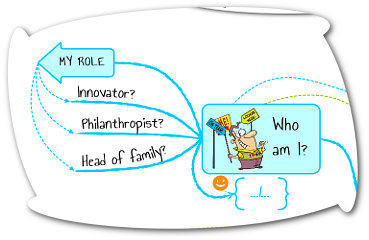 I seem to work on this about once a year and I do find my definition of my identity changing slightly but my core values remain pretty constant. I consider I have a role to both understand myself as well as possible and then pass on my positivity and enthusiasm to others.
I seem to work on this about once a year and I do find my definition of my identity changing slightly but my core values remain pretty constant. I consider I have a role to both understand myself as well as possible and then pass on my positivity and enthusiasm to others.
Personally, I’m moving away from defining myself as a given profession like a teacher or accountant for example; I feel that life is about more than what is just another label. But for some people that might suit them just fine.
To spend your life being regarded as a fine doctor or gifted negotiator or perceptive journalist or meticulous road sweeper or the world’s best dad is a great way to define yourself if that works for you.
What often seems to be lacking is just that though: some sort of identity that you can hang your psychological hat on and say, yep, that’s me. Call it ‘meaning’ if you like, although that might also fit in to Level 6, but many of us do seem to spend a lot of our time striving for it (meaning), so it seems to be rather important to us humans.





Like any model, that’s all these so-called Logical Levels are; a tool invented by someone to try and get a grasp on something we don’t actually understand. And still don’t. In this case it’s the human mind in all its glorious obscurity, so good luck with that!
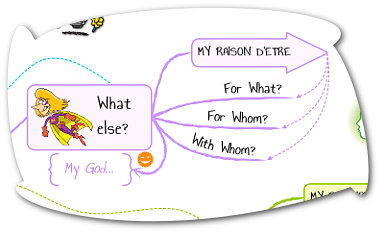 Anyhow, this brings us to a uniquely human characteristic (as far as we know): purpose. This level was tagged on at the end I think, and you can ignore it if you think it’s going too far. The idea was to incorporate the so-called ‘spiritual’ aspect of existence into the model.
Anyhow, this brings us to a uniquely human characteristic (as far as we know): purpose. This level was tagged on at the end I think, and you can ignore it if you think it’s going too far. The idea was to incorporate the so-called ‘spiritual’ aspect of existence into the model.
As a screaming sceptic (but a friendly one), as I mentioned before, when presented with words such as ‘spiritual’ and even ‘god’ I always want to make sure exactly what it is I’m discussing, in case I and the other person have different definitions of the terms.
A first Google search for spiritual turns up two entries: 1) relating to or affecting the human spirit or soul as opposed to material or physical things; 2) relating to religion or religious belief.
This doesn’t help much because now I have to look up spirit and soul (just to be sure). I kind of know what religion generally means.
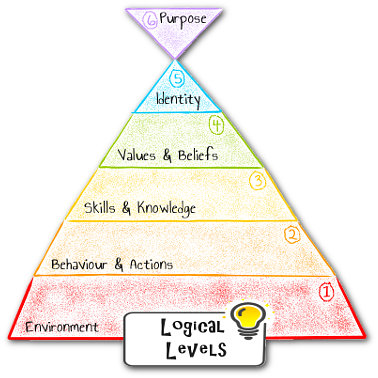 The appropriate meaning of spirit (not ‘team-spirit’) is probably: the non-physical part of a person which is the seat of emotions and character; the soul.
The appropriate meaning of spirit (not ‘team-spirit’) is probably: the non-physical part of a person which is the seat of emotions and character; the soul.
And for soul (not ‘soul music’): the spiritual or immaterial part of a human being or animal, regarded as immortal.
So, the spirit is the soul, and the soul is spiritual, so I’m not much clearer… Anyway, it’s about some sort of deeper or grander meaning for it all, including, for many, the belief in the existence of an invisible supernatural power which controls everything.
Some would say that Level 6 shouldn’t even exist and we should just get on with our earthly lives as best we can, living and loving like there’s no tomorrow. Others believe that Level 6 is by far the most important level, overarching all the others and transcending even life itself.
Whatever your take on it is, with or without Level 6, I personally like to think that whilst we are here on the planet, surrounded by other like-minded and whole-hearted souls, we should do our best to be nice to each other, learning and sharing what we know, helping when we can and enjoying the endless variety and richness of humankind.
Above all, we should start by trying to be ok about ourselves, and take it from there. In fact, there’s nowhere else to take it from.





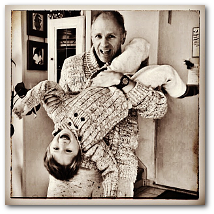 Well, congratulations if you’ve made it this far! There’s not much else for me to say other than to confirm that as soon as you creak open the whole personal development chest you find that it’s actually a bottomless rabbit’s hole like in Alice, down which you risk tumbling and disappearing without trace!
Well, congratulations if you’ve made it this far! There’s not much else for me to say other than to confirm that as soon as you creak open the whole personal development chest you find that it’s actually a bottomless rabbit’s hole like in Alice, down which you risk tumbling and disappearing without trace!
There are so many approaches and models and ‘schools of thought’ and all the rest of it, you can get quite lost if you’re not careful.
I thoroughly recommend you embarking on a personal journey into the very depths of yourself, and I don’t think there’s any right way to do it but remember one thing I’ve learnt: all we really need is to live a rich, enjoyable life on a day-to-day basis. There’s only one day you can start to do that on, and it’s this one!
Thank you for reading, it means a lot, and let me know what you think, ok? ?
![]()
© 2016 Sab Will / Mind Map Mad
 If you’d like to join our friendly mind map discussion groups on Facebook to learn more about mind mapping and submit your own creations, then you’re welcome!
If you’d like to join our friendly mind map discussion groups on Facebook to learn more about mind mapping and submit your own creations, then you’re welcome!
Just click one or more of the buttons below and join up straight away – I look forward to meeting you there 😀
Here are those download links again, and don’t forget to let me know what you think here. What do you reckon about my ‘Robert Dilts Logical Levels’ mind map? Is it an obscure bunch of psychobabble or a really powerful tool to reach deeper levels of understanding and meaning of ourselves and others?
Feel free to share and tell ’em the Mad Mapper sent ya! Success 🙂
JPG Image 800 px ~ JPG Image 1920 px ~ JPG Image 3500 px
PDF Doc 1.3MB ~ PDF Doc 3MB ~ Sab on Biggerplate!
JPG Image 800 px ~ JPG Image 1920 px ~ JPG Image 3500 px
PDF Doc 1.5MB ~ PDF Doc 3.1MB ~ Sab on Biggerplate!
Próximamente…
? (la paciencia es una virtud) ?
JPG Image 800 px ~ JPG Image 1920 px ~ JPG Image 3500px
PDF Document ~ Sab on Biggerplate!
Feel free to use my ‘Robert Dilts Logical Levels’ mind map as follows:
1) For any NON-commercial use
2) Leave it EXACTLY as it is
3) Don’t change ANYTHING
4) Make sure the © Copyright text is included and intact
5) See 2) and 3) (you get the idea!)
You CAN reproduce it online or embed it in your blog or website as long as you…
6) Respect 1-5 above
7) Include a credit to ‘Sab Will / Mind Map Mad’ AND include a clickable link to this page ( http://www.mindmapmad.com/robert-dilts-logical-levels-mind-map/ ) on the web page next to or near the image – thanks!
Anyway, it’s a place absolutely crammed with cool mind maps, including mine – he he! You can download the actual original iMindMap file (the mind mapping software I use) and play around with it yourself. Nice!





 Sab Will enjoys creating fun and helpful mind maps and articles on a wide range of topics.
Sab Will enjoys creating fun and helpful mind maps and articles on a wide range of topics.
As well as Mind Map Mad (this site!) Sab runs
Sab is available for training in innovative thinking, creative problem solving, mind mapping and teacher training in modern ‘learning to learn’ techniques. Please get in touch here to find out how increased creativity and innovation can help boost your business, or how modern approaches to learning can revolutionise your teaching or training.
P.S. Keep up to date will ALL Sab’s latest creative output over on his newest home on the web, the Sab Lab!
© 2016 Sab Will / Mind Map Mad